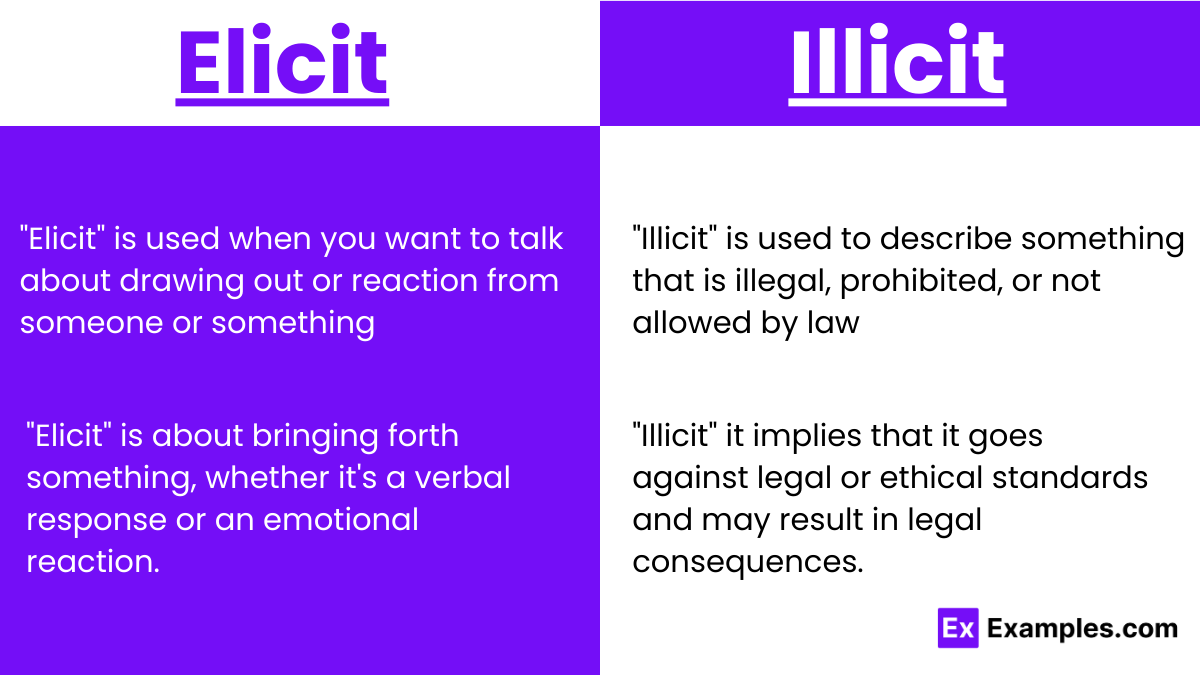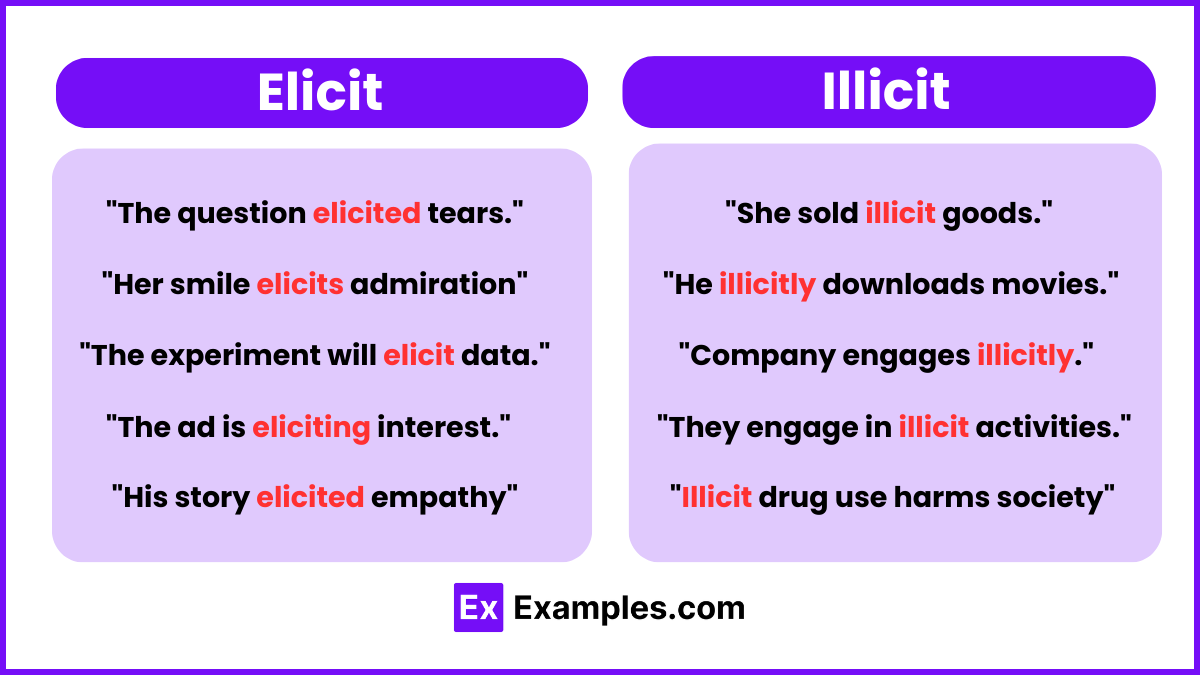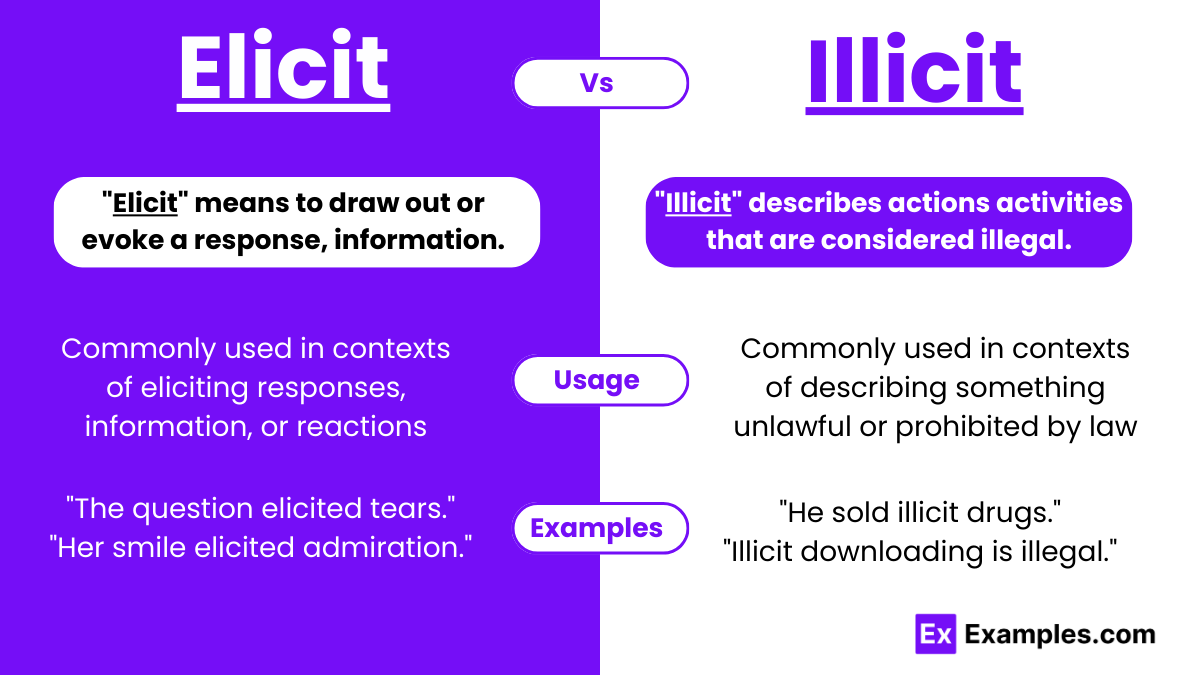Elicit vs illicit – Difference, Meanings, Examples, Usage
“Elicit” and “illicit” are two words often confused due to their similar appearance and sound. However, they carry distinct meanings that are crucial to understand. “Elicit” is a verb used to describe the act of bringing forth a response or reaction, while “illicit” is an adjective referring to something that is illegal or forbidden. Despite their resemblance, these words have entirely different origins and implications. Let’s get into their differences to avoid confusion.
Elicit or Illicit – Meanings
- “Elicit” is primarily a verb. To elicit means to draw out or evoke a response, information, or reaction from someone or something. It involves obtaining or bringing forth a response or reaction through skillful questioning, prompting, or actions.
- “Illicit” can function as both an adjective and a noun. As an adjective, “illicit” describes actions, behaviors, or activities that are considered illegal, forbidden, or not permitted by law or moral standards.
Summary
Think of “elicit” when you’re talking about bringing out a response or information from someone or something. It’s a verb. For instance, you might elicit a confession from a suspect by asking probing questions. Use “illicit” when something is against the law or considered improper. It’s often an adjective. It refers to actions, behaviors, or activities that are improper or against the rules. For example, engaging in illicit activities like smuggling can result in legal consequences.
Origins of Elicit and Illicit
The origins of “elicit” and “illicit” are rooted in Latin:
- Elicit: The word “elicit” comes from the Latin verb “elicere,” which is a combination of “e-” (meaning “out”) and “licere” (meaning “to entice” or “to lure forth”). In Latin, “elicere” meant “to draw out” or “to bring forth.” Over time, this evolved into “elicit” in English, maintaining its original sense of drawing out a response or information.
- Illicit: “Illicit” also has Latin origins, stemming from the word “illicitus,” which is a combination of “in-” (meaning “not”) and “licitus” (meaning “lawful” or “allowed”). Therefore, “illicitus” referred to something that was “not lawful” or “not permitted by law.” This Latin term later transformed into “illicit” in English, retaining its meaning of something forbidden or unlawful.
How to pronounce Elicit and Illicit
- Elicit: Pronounced “ih-LISS-it“ or “ee-LISS-it“. The stress is typically placed on the second syllable, and the “i” sounds like the “i” in “bit”.
- Illicit: Pronounced “ih-LISS-it“ or “ee-LISS-it“. Like “elicit,” the stress is usually on the second syllable, and the “i” sounds the same as in “bit”.
What’s The Difference Between Elicit and Illicit?
| Criterion | Elicit | Illicit |
|---|---|---|
| Usage | Commonly used in contexts of eliciting responses, information, or reactions through questioning, stimuli, or actions | Commonly used in contexts of describing something unlawful or prohibited by law |
| Linguistic Origin | Derived from the Latin word “elicere,” meaning “to draw out” | Derived from the Latin word “illicitus,” meaning “not allowed” |
| Legality | Generally legal and morally acceptable | Generally illegal and morally unacceptable |
| Consequences | Often leads to positive outcomes, such as obtaining information or insights | Often leads to negative outcomes, such as legal penalties or harm |
| Context | Commonly found in academic, therapeutic, or investigative settings | Commonly found in legal, criminal, or regulatory contexts |
How To Remember The Difference Between Elicit and Illicit
- Elicit: Think of “eliciting” as bringing something out or drawing it forth. The key is the letter “e” at the beginning of “elicit,” which can stand for “extract” or “evoke.” So, “elicit” means to draw out a response, information, or reaction.
- Illicit: Notice the similarity between “illicit” and “illegal.” Both words start with “il-“ and share the same sound. This similarity can help you remember that “illicit” refers to something unlawful, prohibited, or not permitted by law.
How to use Elicit and Illicit

Usage of Elicit
- Elicit: The word “elicit” is used when you want to talk about drawing out or evoking a response, information, or reaction from someone or something. For example, a teacher might use a question to elicit responses from students during a class discussion. Similarly, a researcher might conduct experiments to elicit certain behaviors from participants. In essence, “elicit” is about bringing forth something, whether it’s a verbal response, an emotional reaction, or specific information.
Usage of Illicit
- Illicit: On the other hand, “illicit” is used to describe something that is illegal, prohibited, or not allowed by law. This could refer to activities such as drug trafficking, smuggling, or other criminal actions. For instance, the possession and distribution of illicit drugs are against the law in many countries. When something is described as “illicit,” it implies that it goes against legal or ethical standards and may result in legal consequences.
Using Elicit and Illicit in a sentence with Examples

Elicit Examples:
- Present tense: The psychologist elicits memories from her patients.
- Past tense: The survey elicited a variety of responses from the participants.
- Present participle: She is eliciting feedback from the team members.
- Past participle: The experiment has elicited valuable data for the research.
Illicit Examples:
- Present tense: The authorities frequently confiscate illicit substances from smugglers.
- Past tense: The police raided the warehouse and seized illicit goods.
- Present participle: They are investigating the illicit activities of the organized crime ring.
- Past participle: The company was fined for selling illicit products on the black market.
Synonyms
| Elicit Synonyms | Illicit Synonyms |
|---|---|
| Extract | Illegal |
| Evoke | Unlawful |
| Prompt | Prohibited |
| Obtain | Forbidden |
| Draw out | Against the law |
Exercise
- The undercover detective was tasked with __________ information about the illegal operation.
- The journalist’s probing questions managed to __________ valuable insights from the interviewee.
- The police seized several packages of __________ drugs during the raid.
- The artist’s work of art managed to __________ a range of emotions from the audience.
- It is against the law to engage in __________ activities such as gambling in this establishment.
- The teacher used various techniques to __________ participation from her students during the class discussion.
Answers
- elicit
- elicit
- illicit
- elicit
- illicit
- elicit
FAQ’s
What does it mean to elicit something?
To elicit means to draw out or evoke a response, reaction, or information deliberately through questioning, prompting, or other means.
What is the difference between elicit and illicit and solicit?
Elicit: To draw out a response. Illicit: Unlawful or forbidden. Solicit: To seek or request persistently.
Is it elicit a response or illicit?
It is “elicit a response.” Elicit means to draw out, while illicit refers to actions that are illegal or forbidden.
What does the term illicit mean?
“Illicit” means something unlawful or prohibited by law or moral standards, encompassing illegal activities or behaviors not sanctioned by authorities.
What are 2 synonyms for illicit?
Synonyms for illicit include illegal and unauthorized, describing actions or behaviors that are against the law or not permitted.
What is an example of illicit?
An example of illicit behavior is the distribution and consumption of illegal drugs or engaging in an extramarital affair, both violating legal or moral standards.



